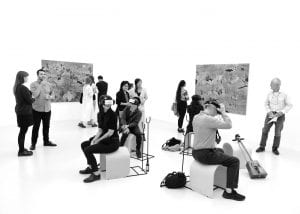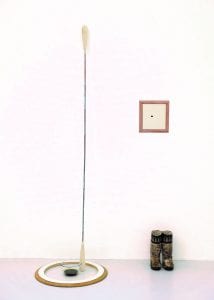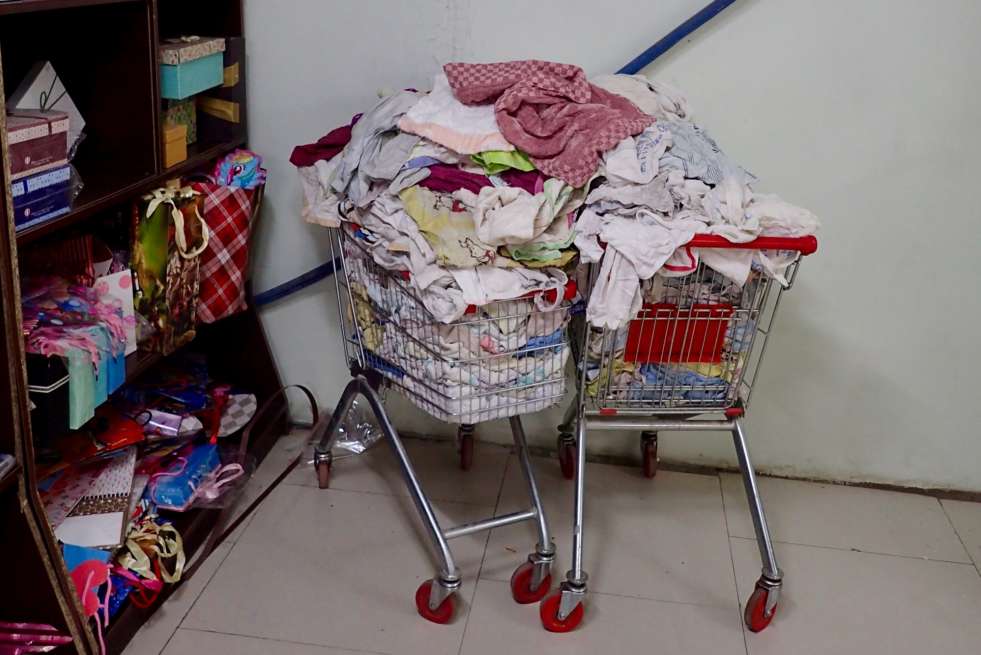By Hermione Spriggs – Curator of the Five Heads exhibition.
The Emerging Subjects exhibition Five Heads launched ceremoniously at greengrassi & Corvi-Mora on August 31st. It opened with introductory speeches, vodka libations to bless the artworks on show, and a morin khuur (“horsehead fiddle”) performance by London-based Mongolian musician Victor Nyamdavaa. The exhibition included works by Tuguldur Yondonjamts, Deborah Tchoudjinoff, Baatarzorig Batjargal, Yuri Pattison, Dolgor Ser Od and Marc Schmitz. It received reviews from Art Agenda and Contemporary art Daily, and will feature in the Nov/Dec issue of ArtAsiaPacific.

Five Heads, Installation View (photograph Brett Dee)

Five Heads opening event at greengrassi & Corvi-Mora (photograph Brett Dee)

Deborah Tchoudjinoff, Baigala, 2018. Steel, wood, VR (photograph Brett Dee)
Throughout the Five Heads project we have followed a guiding Mongolian principle of “separating to connect,” leaving space for new meaning to emerge through layers of exchange, translation and material process. Beyond the surprising and interrogative art works you see pictured here, new lasting relationships have formed through our gathering around the exhibition launch in London. These relationships will no doubt motivate future iterations of the project, and further experiments in art-anthropology collaboration. The experience of curating Five Heads and the warm afterglow that persists in its wake are well expressed through an anecdote Rebecca Empson shared with me, by way of a conversation she had with the recently deceased anthropologist Roy Wagner (whose own work was a major influence on the conceptual formation of Five Heads). Roy told Rebecca that certain research can only be conducted with and through humour. Of course, a peal of laughter – as with a flash of inspiration, or poetic analogy – involves a burst of energy that connects two disparate realms. In this sense, the works resulting from Five Heads can be thought of as metamorphic forms born of frictive energy released through the collision of art and anthropology. Or as “pearls and coral” thrown up from an underworld of hidden connections; that which Walter Benjamin has described as the “new beauty in what is vanishing.”[1]

Ser Od & Schmitz, “North of the North Pole”, Five Heads, greengrassi & Corvi-Mora, 2018 (photograph Brett Dee)
Exhibition publication
Launched in tandem with the Five Heads exhibition at greengrassi and Corvi-Mora, the publication Five Heads (Tavan Tolgoi): Art, Anthropology and Mongol Futurism (Hermione Spriggs, Ed., Sternberg Press, 2018) features visual documentation of multiple art-anthropology exchange processes, ethnographic texts, and further written contributions by Hermione Spriggs & Rebecca Empson, Richard Irvine, Simon O’ Sullivan, Uranchimeg Tsultem and Tsendpurev Tsegmid that introduce contemporary Mongolia as a dynamic site for conceptual and creative experimentation.


Cover and excerpt from Five Heads (Tavan Tolgoi): Art, Anthropology and Mongol Futurism.
In the essay section of this book, the Green Horse Society tells a history of art and culture newly untethered in post-Soviet Mongolia; an early style of ethnographic art known as “One Day in Mongolia” painting provides a canvas for urgent environmental protest; Mongolian hip-hop and nationalist poetry become ciphers for thinking through deep time; and space is opened up for what Simon O’Sullivan terms the “art-anthropology probe head” to do its important work. The book is available to purchase from the front desk of the UCL Anthropology Department, or directly from the publisher here.
The exhibition has now formally come to a close, but our conversation continues through a series of events hosted in collaboration with the cross-disciplinary art and research centre Arts Catalyst. Earlier this month we launched the publication with a panel discussion between artists Tuguldur Yondonjamts and Hermione Spriggs and anthropologists Bumochir Dulam and Rebecca Empson at Arts Catalyst. If you missed this but would like to listen back, the conversation will be soon available to stream. A subsequent display of materials showcasing the process behind the art-anthropology exchange will be open to the public in the UCL Department of Anthropology Foyer from the 8th October.
Tuguldur Yondonjamts is currently living and working in London as Artist in Residence at Arts Catalyst, and his evolving exhibition of work in progress is open to the public until the November 3rd (details here). On October 10th Tuguldur’s paired anthropological researcher Rebekah Plueckhahn is co-leading the workshop “The Infrastructure of Fortune: Extraction and Resistance” with artist Mikhail Karikis, also at Arts Catalyst. For more information and to book a place please follow this link.
[1] Walter Benjamin quoted in Hannah Arendt, Introduction to Walter Benjamin, Illuminations: Essays and Reflections [1st publ. by Suhrkamp Verlag, 1955] (Harcourt Brace Jovanovich 1968).
Filed under Anthropology, Bank and Credit Market, Conceptual and Theoretical Approaches, Environmental and Nationalist Movements, Ethnographic Studies, Methodology, Mining, Press, Project News, Property and Ownership, Publications, Talks and Seminars, Trade, Uncategorized
Tags: anthropology, art, artist exchange, collaboration, conference, environment, ethnography, Findings, future, methodology
391 Comments »
 Close
Close










